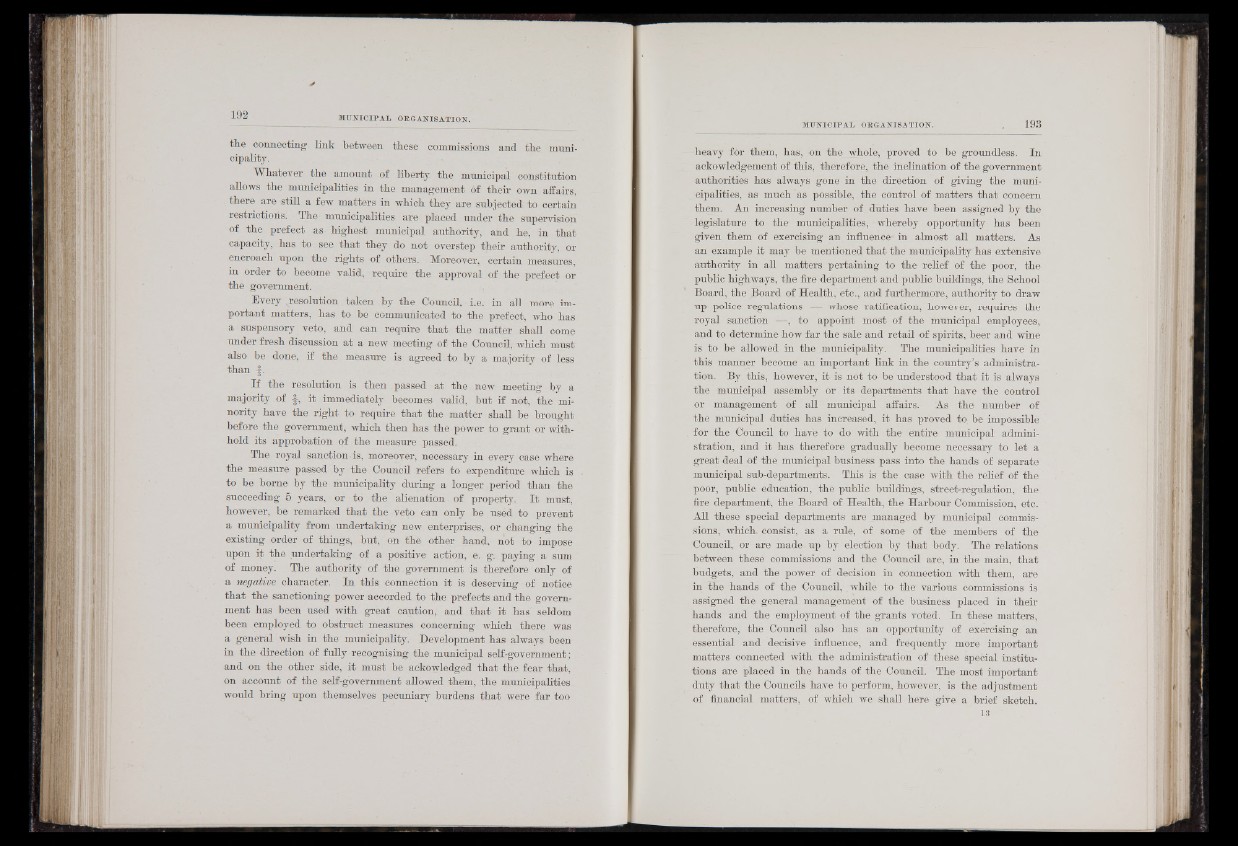
the connecting link between these commissions and the municipality.
Whatever the amount of liberty the municipal constitution
allows the municipalities in the management of their own affairs,
there are still a few matters in which they are subjected'to certain
restrictions. The municipalities are placed under the supervision
of the prefect as highest municipal authority, and he, in that
capacity, has to see that they do not overstep their authority, or
encroach upon the rights of others. Moreover, certain measures,
in order to become valid, require the approval of the prefect or
the government.
Every .resolution taken by the Council, i.e. in all more important
matters, has to be Communicated to the prefect, who has
a suspensory veto, and can require that the matter shall come
under fresh discussion at a new meeting of- the Council, which must
also be done, if the measure is agreed.to by a majority of less
than
If the resolution is then passed at the new meeting by a
majority of f, it immediately becomes valid, but if not, the minority
have the right to require that the matter shall be brought
before the government, which then has the power to grant or withhold
its approbation of the measure passed.
The royal sanction- is, moreover, necessary in every case where
the measure passed by the Council refers to expenditure which is
to be borne by the municipality during a longer period than the
succeeding 5 years, or to the alienation of property. I t must,
however, be remarked that the veto can only be used to prevent
a municipality from undertaking new enterprises, or changing the
existing order of things, but, on the other hand, not to impose
upon it the undertaking of a positive action, e. paying a sum
of money. The authority of th e . government is therefore only of
a negative character. In this connection it is deserving of notice
that the sanctioning power accorded to the prefects and the government
has been used with great caution, and that it has seldom
been employed to obstruct measures concerning which there was
a general wish in the municipality. Development has always been
in the direction of fully recognising the municipal self-government;
and on the other side, it must be ackowledged that the fear that,
on account of the self-government allowed them, the municipalities
would bring upon themselves pecuniary burdens that were far too
heavy for them, has, on the whole, proved to be groundless. In
, ackowledgement of this, therefore, the inclination of the government
authorities has always gone in the direction of giving the municipalities,
as much as possible, the control of matters that concern
them. An increasing number of duties have been assigned by the
legislature to the municipalities, whereby opportunity has been
given them of exercising an influence- in almost all matters. As
an example it may be mentioned that the municipality has extensive
authority in all matters pertaining to the relief of the poor, the
public highways, the fire department and public buildings, the School
Board, the Board of Health, etc., and furthermore, authority to draw
up police regulations 3 whose ratification, however, requires the
royal sanction to appoint most of the municipal employees,
and to determine how far the sale and retail of spirits, beer and wine
is to be allowed in the. municipality. The municipalities have in
this manner become an important link in the country’s administration.
By. this, however, it is not to be understood that it is always
the municipal assembly or its departments that have the control
or management of all municipal affairs. As the number of
the municipal duties has increased, it has proved to be impossible
. for the Council to have to do with the entire municipal administration,
and it has therefore gradually become necessary to let a
great deal of the municipal business pass into the hands of separate
municipal sub-departments. This is the case with the relief of the
poor, public education, the public buildings, street-regulation, the
fire department, the Board of Health, the Harbour Commission, etc.
All these special departments are managed by municipal commissions,
which consist, as a rule, of some of the members of the
Council, or are made up by election by that body. The relations
between these commissions and the Council are, in the main, that
budgets, and the power of decision in connection with them, are
in the hands of the Council,. while to the' various commissions is
assigned the general management of the business placed in their
hands and the employment of the grants voted. In these matters,
therefore, the Council also has an opportunity of exercising an
essential and decisive influence, and frequently more important
matters connected with the administration of these special institutions
are placed in the hands of the Council. The most important
duty that the Councils have to perform, however, is the adjustment
of financial matters, of which we shall here give a brief sketch.
13 I